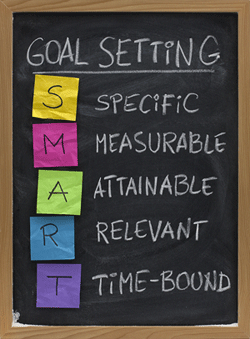Most people have goals — little goals throughout each day to major life goals. But without motivation, you’ll never reach those goals. You’ll just lounge around wasting your life.
No matter what kinds of goals you’re working towards, there are plenty of things you can do to motivate yourself so you keep working on them and don’t let opportunities pass you by. Here are some self-motivational tips you can use to help you reach your own goals — big or small.

- Write down your goals.
- Make goals specific and measurable.
- Break larger goals down into mini-goals.
- Enlist a support network.
- Avoid people who discourage you.
- Stop procrastinating.
- Reward yourself.
- Consider the consequences.
- Keep your life, home, or office organized.
- Envision yourself achieving your goals.
Now let’s take a closer look at each of these self-motivational tips, including examples of how they can help you reach your goals.
Get Specific if You Want to Succeed!
It’s one thing to tell yourself “I’d like to lose weight.” But that’s not really much of a goal. A better plan is to follow the old business advice for planning marketing and PR campaigns — make your goals specific and measurable.
When goals are specific and measurable you know exactly what you’re working towards, and you can put together a concrete plan to make things happen. So instead of saying “I’d like to lose weight,” say “I want to lose 20 pounds within six months.” You have a time frame to work with, and you can actually measure your weight loss goal of 20 pounds.
It’s not enough to make them specific and measurable. Write your goals down and keep them where you’ll be constantly reminded. For example, with weight loss you might keep a note on the fridge so you see it and it helps you avoid bad decisions like grabbing a pint of ice cream that might sabotage your efforts when you’re feeling down. Or make a note on your calendar or in your PDA with specific dates to check-in. For example, put where your weight should be at the end of each month so you’re reminded to keep checking and to stay on course.
Goal-Setting Step-by-Step (or the Power of Mini-Goals)
One of the biggest potential problems with achieving our bigger goals in life is that we think so much about the big picture that it can be overwhelming. Let’s say you’re currently out of work and you need to find a job within the next three months. If you don’t reach that goal right away you might get discouraged and stop trying altogether. That’s no good.
Instead, think of ways you can break things down. Little accomplishments along the way can do a lot to keep you feeling motivated as you work towards your end goal. For example, you might have mini-goals that involve sending out a minimum of five resumes every week. Or maybe you’ll set a mini-goal to attend at least one networking event each month. You’ll know that you’re taking the steps you need to take, and even if one resume doesn’t land you your dream job, you at least know that you didn’t sit around letting opportunities pass you by. And you’ll know that next week you’ll have even more opportunities with the new resumes you’ll send out.

Support Networks and Naysayers
Achieving your goals is often easier when you can share that goal with likeminded people. Let’s take a very big, but very common, goal as an example — starting your own business. Chances are good that you can’t do everything by yourself. Or at least you can’t do things efficiently if you don’t take the time to learn from others.
If you have supportive friends and family members, that’s outstanding. Not everyone with this goal does. If one of them has been through the startup process before that’s even better. But if you don’t have that, there are other options. Go online and visit business forums or networks — in your specific industry if possible. You’ll also find peer-centric groups online for work at home moms and dads if you prefer that kind of network and if it’s appropriate for the kind of business you’re starting.
Having a support network in place could also involve getting a mentor (such as through your local SCORE chapter). The point is that you’ll have someone to talk to, someone who can point you in the right direction if you ever feel stuck, and someone who is genuinely interested in seeing you succeed. When you feel like you have to answer to someone else who will regularly check on your progress, that can be incredibly motivational.
Then there’s the other side of the spectrum. What do you do if you have unsupportive people in your life? Again let’s say you’re starting your first business. Let’s say your family doesn’t approve. While you might not be able to ignore them completely, you can avoid that topic of conversation much of the time. Do it. If you constantly expose yourself to criticism and people telling you that you won’t succeed, eventually you’ll start to believe it.

Organization and Procrastination: The Goal-Setter’s Friend and Foe
Some people are born procrastinators. “But I work better under tight deadlines,” they might say. Well, if someone else is setting your goal (like an employer or teacher) maybe that’s true. It was for me in my younger years. But the same doesn’t hold true when it comes to your own goals where no one else is holding you to strict deadlines. If you keep taking the perspective that there’s always tomorrow, you’ll never get anywhere today. You need to take steps now if you want to reach your goals down the road. If you feel overwhelmed and it makes you want to put things off, do what I mentioned earlier and break down your goal into separate mini-goals or targets along your timeline.
It’s also often important to stay organized. Clutter and mess do nothing to help you stay motivated and reach your goals. They’re just one more thing standing in your way, almost begging you to procrastinate.
Get your “house in order” early, and you could speed up the process of reaching your goals. Let’s say you have a goal of saving more money each month — let’s say you want to save $10,000 in the next year. If your finances aren’t organized, you won’t know how much you’re spending and on what. You won’t be able to revamp your budget to squeeze out the extra money for savings. And you will not likely reach your goal. If you need to take some time up front to get things organized, go ahead and do it. That’s not the same thing as procrastination. Sometimes it’s a necessary first step.
Rewards and Consequences
You’ve probably heard this many times — plan rewards for yourself and you’ll have a bigger incentive to reach your goals. For example, if you want to lose 20 pounds, you might buy a pair of “skinny jeans” that would fit then, or a nice dress to wear out when you reach your goal. If you’re working towards getting a new job, maybe your reward will be a nice new suit so you can look and feel your best when you meet your new coworkers. If the goal is to save enough money for a big trip overseas you’ve wanted to take for ages, you might reward yourself with new luggage.
Sometimes reaching the goal is its own reward. But feeling like you’ll get that extra pat on the back certainly doesn’t hurt.
Rewards aren’t always enough though. Sometimes it’s equally motivational (or more) to think about the consequences of not meeting your goal. For example, let’s say your goal is to quit smoking within three months. You might remind yourself of the uncle you never knew well because he died of lung cancer when you were young, and you might find motivation in that because you would rather be there for your own niece or nephew or children. If you don’t have someone in your family who has gone through something like that, you might visit a support group for people who have to see how it’s affected families.
It’s not fun to think about consequences — certainly not as fun as rewarding yourself. But sometimes our greatest motivation doesn’t come from what’s fun. It can come from what frightens us.
Self-Motivation Through Self-Visualization
I’m not the type of person who believes that if you dream something or visualize it, you can always make it happen. I’ve always found that to be overly sentimental hype for selling self-help books. But I do believe strongly that if you can’t see yourself succeeding, you won’t.
Try it. If you can’t see yourself reaching a certain goal (like trying to save a relationship that deep down you know won’t ever work out), maybe that isn’t the right goal to be working towards. Re-evaluate where you currently are in life and picture yourself where you want to be rather than where you are. If you can see it, and if it feels right, then put together a plan to get yourself there. None of the other self-motivational tips here can really do anything if you don’t believe 100% in your goals.
How do you motivate yourself, whether to get out of bed in the morning or reach some huge lifelong goal you have? Leave a comment and share your own goal-setting and self-motivational tips.
Now let’s close things out with some motivational quotes throughout history. Enjoy.













